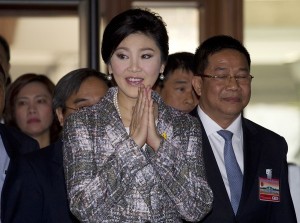Thailand’s attorney general on Thursday pressed criminal charges against former Prime Minister Yingluck Shinawatra for negligence related to her government’s money-losing rice subsidy program, a move likely to prolong conflicts in a divided nation plagued by political turmoil and coups.
Prosecutors from the Office of the Attorney General submitted 20 boxes of documents to the Supreme Court’s criminal division for political title holders, accusing Shinawatra of dereliction in overseeing a rice subsidy program that lost billions of dollars and temporarily cost Thailand its crown as the world’s top rice exporter.
The move is widely seen as another attempt to cripple the political machine of her brother, former Prime Minister Thaksin Shinawatra, who was overthrown in a coup in 2006, and to prevent his allies from returning to power.
Yingluck Shinawatra was ousted by a court decision shortly before the military staged a coup last May and seized power from her elected government.
Thursday’s accusations came one month after she was impeached on similar grounds by the military-appointed legislature, which means she was also banned from politics for five years.
The Supreme Court will set up a nine-judge panel, which will decide March 19 whether to accept the case and formally indict her.
The National Anti-Corruption Commission on Wednesday recommended that the Finance Ministry sue Shinawatra for compensation for damage caused by the rice program and suggested the amount should be at least 600 billion baht ($18.4 billion).
The rice-buying program, a flagship policy that helped Shinawatra’s Pheu Thai Party win elections in 2011, had accumulated losses of at least $4.46 billion since it was introduced in 2011, as the Thai government stockpiled rice to avoid even bigger losses.
Under the program, farmers were paid about 50 percent above what they would get on the world market. The anti-graft body alleged that Shinawatra failed to stop massive losses to state coffers.
This report compiled information from Associated Press.
 CGTN America
CGTN America In this Thursday, Jan. 22, 2015 photo, Thailand’s former Prime Minister Yingluck Shinawatra arrives at parliament in Bangkok, Thailand. Thailand’s attorney general on Thursday, Feb. 19, 2015, pressed criminal charges against former Prime Minister Yingluck for negligence related to her government’s money-losing rice subsidy scheme, a move likely to prolong conflicts in a divided nation plagued by political turmoil and coups.(AP Photo/Sakchai Lalit)
In this Thursday, Jan. 22, 2015 photo, Thailand’s former Prime Minister Yingluck Shinawatra arrives at parliament in Bangkok, Thailand. Thailand’s attorney general on Thursday, Feb. 19, 2015, pressed criminal charges against former Prime Minister Yingluck for negligence related to her government’s money-losing rice subsidy scheme, a move likely to prolong conflicts in a divided nation plagued by political turmoil and coups.(AP Photo/Sakchai Lalit)
